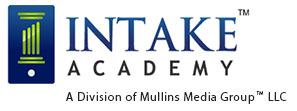I think the most eye-opening and informative aspect of the presentation for me was the Wall of Apathy. It was important for me to hear that most prospective clients are calling us because they need us, but at the outset they may not trust us or even want to be calling. I tend to operate under the naivete that of course everyone trusts me, why wouldn’t they? I haven’t done anything to sacrifice that trust. But it’s not personal; it’s just the nature of things. In light of this, we need to make it a business of relationships and healing. I feel this was a concept that has always been with me, but hearing it presented in this manner will stick with me. It will be on my mind during every intake conversation.
Another very important concept presented was to keep the trigger word “grateful” in your mind at all times when processing an intake. This is another idea that I believe was embedded in me, but explicitly hearing it made a great impact on me. This is so important when you are having a tough day, whether those troubles are personal or professional. This has already resonated for me, as last night I was beginning to get out from under a mountain of paperwork that accrued during a week long vacation. There was an intake call that came in as most employees were leaving for the day. I felt an obligation to put my personal work aside to assess this new case. I really understand how important it is to be grateful for every call and the opportunity to be a part of this business of relationships and healing.
I also really enjoyed the aspect of managing a prospective client’s wants and needs. I tend to take it personally and allow it to really weigh on me when I cannot give the caller everything he/she wants (i.e., us to accept their case). I always feel awful and hate being that bearer of bad news. It was good to hear and recognize that we must give them everything they need, but all we can do is maximize what they want. It is easy to give them what they need by simply showing empathy, listening, and focusing on their problems. But we do not get to create the law, so giving every caller what they want is impossible. All we can do is try to maximize delivery on those wants.
Finally, another term I really took to heart was “compassionately interrupting.” I have been personally trying to do a better job of controlling intake conversations. Sometimes I feel so bad for our callers I just allow them to vent. But this is not always the most productive strategy, particularly where it is clear that there may not be a case. It’s important to recognize that controlling a conversation doesn’t mean you have to lack empathy and compassion. You don’t have to be rash or militant with the caller. It was good to hear that it is totally acceptable and necessary to control a conversation. It is part of the process to interrupt, reign in the caller and get them focused on what is important and relevant. This is necessary provided there is compassion involved so I really liked that concept of “compassionately interrupting.”
Overall, I think this was a great program and I have already tried putting the techniques into my practice. Thank you and I look forward to the continued training we will receive in the next year.
– Michael Sabolinski, Schwartzapfel Advocates Ltd.

Recent Comments